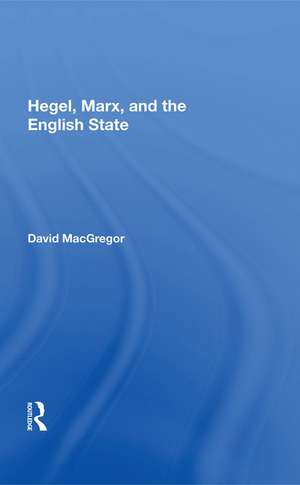Hegel, Marx, And The English State
Autor David MacGregoren Limba Engleză Hardback – 23 mai 2019
Preț: 766.65 lei
Preț vechi: 1028.85 lei
-25% Nou
Puncte Express: 1150
Preț estimativ în valută:
146.71€ • 152.24$ • 122.63£
146.71€ • 152.24$ • 122.63£
Carte tipărită la comandă
Livrare economică 18 martie-01 aprilie
Preluare comenzi: 021 569.72.76
Specificații
ISBN-13: 9780367004163
ISBN-10: 036700416X
Pagini: 355
Dimensiuni: 146 x 229 mm
Greutate: 0.59 kg
Ediția:1
Editura: Taylor & Francis
Colecția Routledge
Locul publicării:Oxford, United Kingdom
ISBN-10: 036700416X
Pagini: 355
Dimensiuni: 146 x 229 mm
Greutate: 0.59 kg
Ediția:1
Editura: Taylor & Francis
Colecția Routledge
Locul publicării:Oxford, United Kingdom
Cuprins
1. Introduction, 2. Not Reform but Revolution, 3. A Hegelian Marx, 4. Personality, 5. The Father's Arbitrary Will Within the Family, 6. Hegel's Theory of Property, Part I: Possession and Use, 7. Hegel's Theory of Property, Part II: Oass Consciousness, 8. Dialectical Inversion of the Free Contract, 9. Marx and the Factory Acts, 10. The Rational State, References, About the Book and Author, Index
Descriere
In this radically revised intellectual portrait of Hegel and Marx that challenges standard interpretations of their political theory, David MacGregor considers the nature of the state in capitalist society. This is the first book to place Marx’s and Hegel’s political thought directly into social and historical context. Revealing the revolutionary content of Hegel’s social theory and the Hegelian themes that underlie Marx’s analysis of the English state in Capital, the author shows how the transformation of the Victorian state in the nineteenth century influenced the mature Marx to reclaim Hegelian arguments he had earlier abandoned. These ideas included a theory of politics and social class that colored Marx’s view of capitalist and working-class opposition to government reform initiatives. MacGregor criticizes interpretations of state action that present government solely as a tool of capitalist and patriarchal interests. Noting the essential significance of child labor in the growing industrialization during Hegel’s and Marx’s time, the author contends that “alienation,” as the two philosophers understood the term, assumes a labor force in which many workers are socially powerless children and women. Given these conditions, the centrality of the English Factory Acts to workers’ lives becomes obvious, a centrality acknowledged by Marx but forgotten by his followers. The author concludes his discussion with an assessment of current arguments about the state and civil society, relating these debates to Hegel’s conception of the rational state.
